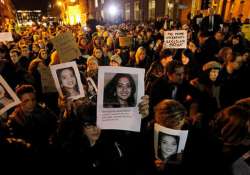Irish govt must clarify on abortion issue: Amnesty
London, Nov 17: Observing that the tragic death of Indian dentist Savita Halappanavar illustrates a gap in Irish law, rights group Amnesty on Saturday asked Ireland to ensure that its domestic policy on access to

London, Nov 17: Observing that the tragic death of Indian dentist Savita Halappanavar illustrates a gap in Irish law, rights group Amnesty on Saturday asked Ireland to ensure that its domestic policy on access to abortion is in line with international human rights law.
0Amnesty International has written to Irish minister for health James Reilly over the issue expressing its concern.
It said Amnesty is concerned that the tragic case of Savita illustrates a gap in Irish law and policy on the most basic human rights level—that is a woman's right to access abortion where her life is at risk.
“International human rights law is clear about the right of a woman to access a safe and legal abortion where her life is at risk,” said Colm O'Gorman, Executive Director of Amnesty International in Ireland.
“Successive Irish governments have failed in their duty to provide the necessary clarity on how this right is protected and vindicated, leaving women in Ireland in a very vulnerable position. Government must offer this clarity without further delay,” he said.
Noting this right has already been established as a Constitutional principle by the Irish Supreme Court, the body expressed concern about lack of clarity on the issue.
“Ireland has been subject to criticism from international human rights bodies for its failure to bring domestic legislation in line with international human rights principles, including a very clear ruling from the European Court of Human Rights,” said Marianne Mollmann, senior policy advisor at Amnesty International Secretariat.
Savita, a 31-year old Indian dentist after doctors refused to terminate her pregnancy even after telling her that she was miscarrying.
The incident has reignited the debate over right to abortion in cases of risk in the Catholic country.
The report of the UN's Review of Ireland's human rights record in October last year contains repeated calls from UN member states to bring Ireland's domestic law in
line with international human rights obligations and at the very least regulate access to life-saving abortions.
In 2011 the UN Committee Against Torture urged Ireland to clarify the scope of legal abortion through statutory law.
0Amnesty International has written to Irish minister for health James Reilly over the issue expressing its concern.
It said Amnesty is concerned that the tragic case of Savita illustrates a gap in Irish law and policy on the most basic human rights level—that is a woman's right to access abortion where her life is at risk.
“International human rights law is clear about the right of a woman to access a safe and legal abortion where her life is at risk,” said Colm O'Gorman, Executive Director of Amnesty International in Ireland.
“Successive Irish governments have failed in their duty to provide the necessary clarity on how this right is protected and vindicated, leaving women in Ireland in a very vulnerable position. Government must offer this clarity without further delay,” he said.
Noting this right has already been established as a Constitutional principle by the Irish Supreme Court, the body expressed concern about lack of clarity on the issue.
“Ireland has been subject to criticism from international human rights bodies for its failure to bring domestic legislation in line with international human rights principles, including a very clear ruling from the European Court of Human Rights,” said Marianne Mollmann, senior policy advisor at Amnesty International Secretariat.
Savita, a 31-year old Indian dentist after doctors refused to terminate her pregnancy even after telling her that she was miscarrying.
The incident has reignited the debate over right to abortion in cases of risk in the Catholic country.
The report of the UN's Review of Ireland's human rights record in October last year contains repeated calls from UN member states to bring Ireland's domestic law in
line with international human rights obligations and at the very least regulate access to life-saving abortions.
In 2011 the UN Committee Against Torture urged Ireland to clarify the scope of legal abortion through statutory law.